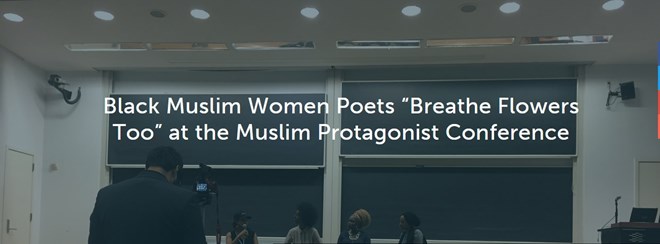muftah
Wednesday April 5, 2017

This year’s Muslim Protagonist conference at Columbia University in New York City opened last weekend with an empowering and much-needed panel entirely comprised of Black, Muslim women poets.
The panel titled, “black women breathe flowers too,” the first line of “greenhouses” by of Nayirrah Waheed (another Black Muslim woman poet), featured Ladan Osman, a Somali-American poet, and two Sudanese-American poets, Safia Elhillo and Afaq Mahmoud.
Each of these women had their own unique stories about experiencing marginalization, both in their familial homelands and the United States, where they grew up. Reading from one of her recent poems, Afaq Mahmoud beseeched: “Trump please keep your hands off of me, I am Sudanese, born in Yemen, living in the United States.” Describing her marginalization within Muslim communities, Mahmoud recited a line from elaborated on the poem she wrote saying, “Everywhere I’ve been, I’ve been asked to leave.”
Safia Elhillo read her poem “callback interview for the position of Abdelhalim Hafez’s Girl.” The poem is in the form of an interview, in which the interviewer tells the poem’s speaker, a Black Sudanese “Girl,” that the dark-skinned beauty who Abdelhalim, the legendary, golden-age era Egyptian singer, croons about is not her, but another non-black, non-Sudanese girl. The poem highlights how Black Arabs are invisible among the Arabic-speaking world.
For these writers, the concept of identity, and conventional ideas surrounding it, is a motivating force. “There was never anyone that occupied the specific intersections that I occupied,” Safia said.
For her, being a writer and poet means “to unlearn that the particular experiences I occupy aren’t deserving of literature.” Ladan spoke of writing as an assertive action: “A lot of it has to do with insisting on my sovereignty and insisting on my soundness.” Afaq referenced the overarching theme of the conference, #ArtAsActivism, as “being the person the younger me needed,” an artist that speaks to experiences not represented in mainstream literature. As a writer, “I kept questioning my own right to tell my story,” Afaq explained. “I write for the me that didn’t have anyone like me to read.”
Over one-third of American Muslims are Black Muslims, and yet they are the least represented within narratives about Muslims in the United States. These women who stand at the cross-sections of various, sidelined identities, are transcending rigid categories and defying how their intersecting communities perceive them.
Ladan Osman’s poem, “Water” which she recited at the event, encapsulates this fluidity of the self:
I am subject to you in the way the water is subject
to the moon. You are subject to me in the way a wall
is subject to its roof. And like the water I expect
you to come upon me of a sudden, like flesh
out of a slit in cloth. And like the wall you expect
intimate collapses, capillaries of change
inscribed day by day on our surfaces.